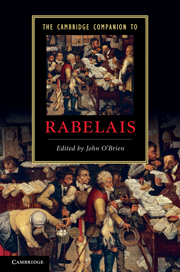Book contents
- Frontmatter
- 1 Introduction
- 2 Reading the works of Rabelais
- 3 Laughing in Rabelais, laughing with Rabelais
- 4 Interpretation in Rabelais, interpretation of Rabelais
- 5 Making sense of intertextuality
- 6 Pantagrueline humanism and Rabelaisian fiction
- 7 Putting religion in its place
- 8 Pantagrue and Gargantua: The political education of the king
- 9 Histories Natural and Unnatural
- 10 Reading and unraveling Rabelais through the Ages
- Guide to further reading
- Index
6 - Pantagrueline humanism and Rabelaisian fiction
Published online by Cambridge University Press: 28 January 2011
- Frontmatter
- 1 Introduction
- 2 Reading the works of Rabelais
- 3 Laughing in Rabelais, laughing with Rabelais
- 4 Interpretation in Rabelais, interpretation of Rabelais
- 5 Making sense of intertextuality
- 6 Pantagrueline humanism and Rabelaisian fiction
- 7 Putting religion in its place
- 8 Pantagrue and Gargantua: The political education of the king
- 9 Histories Natural and Unnatural
- 10 Reading and unraveling Rabelais through the Ages
- Guide to further reading
- Index
Summary
The current debate about the definition of humanism attempts to encompass the change that took place between the late Middle Ages and the Renaissance. It is as well to keep to a definition of humanism as the restoration of “humane letters” in contrast with theology which dominated the whole curriculum when Rabelais was a Franciscan monk (between about 1511 and 1524). Its influence diminished considerably during his Benedictine period (up to 1536) and still further during the following years when he was a doctor and secular priest. From now on, the active life took precedence over the contemplative life in the context of “civic” humanism, and this was linked, in France, to the supreme political authority, the king. From their acquaintance with classical philosophies, many French humanists aspired to become Royal Counselors, like Guillaume Budé, thus directly rivaling the traditional role of the regular (monastic) clergy. Secular (non-monastic) clergy were often Gallican and contributed to strengthening the monarchy. As the secretary and doctor of two intimates of the king (Guillaume and Jean du Bellay), Rabelais, after the publication of Pantagruel and Gargantua, found himself drawn into a political humanism whosemilitant character is clear from Book 4.
- Type
- Chapter
- Information
- The Cambridge Companion to Rabelais , pp. 73 - 92Publisher: Cambridge University PressPrint publication year: 2010



